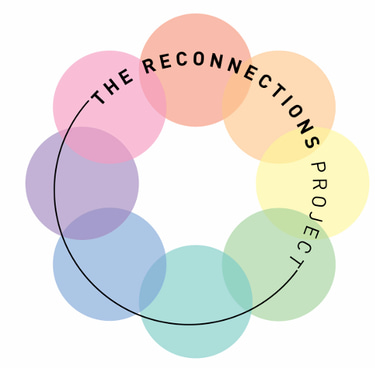Reconnecting with Boundaries
For those of us working for the public good, it is far too easy to feel that we are not doing enough. But without boundaries, we can't be effective. Burnout rates in the sector are higher than ever and it is time we learn to treat each other (and ourselves) with the compassion we deserve.
RECONNECTING
Dr Trent Grassian
7/1/20254 min read


Nowadays, it feels harder than ever to create distance between ourselves and the chaos, greed, and destruction that seem to be everywhere we turn. But if we are swept up by the chaos that surrounds us, our lives and thoughts will become chaotic. And chaos just breeds more chaos...
It was only after working as an SEN teacher that I came to understand that establishing and maintaining boundaries isn't selfish – they are essential, especially for those of us committed to working for the public good.
When we are working to make the world a better place, it is far too easy to acquire and model bad habits that can result in burnout. Leaders often model unhealthy working patterns, while organisations can promote long working days, where staff are always available and take minimal time off. It is far too easy to check our work email on our phone first thing in the morning and before we go to bed. Or to allow feelings of urgency to keep us going, working harder, taking fewer breaks, and, ultimately, working ourselves to exhaustion.
It is no wonder that burnout rates are higher than ever. Recent research from the US found that 95% of nonprofit leaders were worried about burnout, while just 12% of charity staff in London say that their organisations are equipped to address burnout. Another study found that 3 in 10 UK charities were seeing increases in burnout and/or exhaustion.
After experiencing my own burnout, I thought I had done a good job establishing boundaries. I stopped responding to emails outside of work hours (usually), I took a good amount of holiday, and tried to maintain a work-life balance (a phrase that in the modern world can feel like an imaginary utopia...)
But what I didn't realise was that while I had created many physical boundaries, I had not created enough emotional boundaries. I was taking on the stress and worry of not only the people around me, but the world. Every global problem felt like my responsibility and I couldn't find a way to turn off the feeling that I needed to be doing more.
Eventually, that constant state of stress and guilt led to not another burnout, but chronic illness. After living through nearly five years of very poor health, I have learned a lot about boundaries and how incredibly important they are.
Addressing burnout and supporting staff to create and maintain healthy boundaries that promote well-being is essential. Here are 3 reasons why:
1. Burnout is expensive
It is important that staff are supported to take care of themselves (including taking enough sick leave whenever it is needed). From a purely financial perspective, addressing burnout is cost-effective. Recruiting and retraining staff takes time and money. Staff being on long-term sick leave costs money and increases the burden on other staff. When staff leave due to burnout, whether temporarily or permanently, organisations face the added cost of losing valuable knowledge and expertise. It can take a very long time for staff to acquire essential knowledge and skills. It is much better to keep and support impactful staff than to cause burnout!
2. If we want to make the world a better place, we need to start with our staff
I've written many times about the importance of starting with the world we want to see and then working backwards. If we want to live in a world where people are valued and treated with respect, where well-being is integrated into every aspect of our lives, than there is no better place to model this than within our own cultures.
3. Happy staff do a better job
Supporting our staff to have fulfilled lives will increase their commitment to our work and make them more productive. This is why initiatives like the 4 Day Week make so much sense. It's not about how many hours people work; it's about their excitement and dedication to their work.
Trent's Top Ten Tips to Create & Maintain Healthy Boundaries
Be honest with yourself - It is easy to trick ourselves into thinking we are okay with something or that we have enough time and energy to do even more. Listen to what your body is telling you.
You can't do it all - You may want to. You may know someone else who seems to, indeed, be doing it all. But we are humans, and we have limitations.
Self-care is radical - As Tricia Hersey says in her book, Rest is Resistance: “Loving ourselves and each other deepens our disruption of the dominant systems. They want us unwell, fearful, exhausted, and without deep self-love because you are easier to manipulate when you are distracted by what is not real or true.” Take care of yourself. You can start by reading Hersey's book!
Think about boundaries in all aspects of your life. Boundaries aren't just about work. All relationships require boundaries. With the constant pressure to do, do, do, you need to be honest with yourself about the boundaries you need and how you can apply them to your life.
Just because someone asks you to do something, doesn't mean you have to - This is true in and out of work. Consider requests before saying yes. Are there alternatives? Is it essential? Is it even your responsibility? Do you have the energy, time, and ability? What is your motivation for helping?
Communicate your boundaries - The more you tell people you have a boundary (e.g., I don't respond to emails after 5:00), the easier it will be for you to maintain it.
(For managers & leaders) Model healthy boundaries - The easiest way to tell if an organisation's staff have a healthy work-life balance is to look at what the leadership is doing. If you work outside of your core hours, don't take leave, work while ill, and don't take regular breaks, the impact isn't just on you, it's on your whole organisation. Unnamed power dynamics allow bad habits to trickle down.
Be specific - Without clear parameters for our own boundaries, it is easy to let them slip.
Reduce your media intake - Spend less time on social media and less time engaging with the news. It is one thing to stay informed, it is another to feel overwhelmed.
Know your worth - You deserve a balanced, happy, healthy life.
How can you reconnect with your boundaries today?
